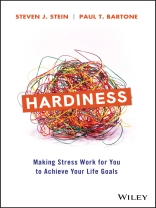Learn to embrace the 3 C’s of psychological hardiness to overcome stress and increase personal growth
Life is full of questions. How you answer these questions can determine which path your life takes. Think about how many questions you are faced with every day. It can be overwhelming. From the mundane to the profound, questions help you navigate everything from your daily routine to your career choices and relationships. Sometimes, asking the right question is just as important as the answer: What do you want out of life? Is it financial success? A loving family? Career achievement? Maybe you are coping with a serious illness. Whatever your goal may be, you have undoubtedly encountered barriers that slow your progress. One of the biggest of these barriers is stress. Scientific research has found that your ability to resist the damaging effects of stress—your hardiness—can reduce stress-related illness and strengthen your ability to thrive under pressure.
Hardiness, written by respected clinical and research psychologists, will help develop your psychological hardiness which, in turn, enables you to enjoy more of life’s rewards. Mastering the 3 C’s of hardiness—commitment, control, and challenge—is essential to increasing hardiness and responding effectively to stressful situations. This invaluable guide provides exercises and activities, based on 30 years of research, specifically designed to increase your hardiness in all areas of your personal and professional life. This book will help you:
- Understand how hardiness is assessed to evaluate and improve your response to stress
- Unlock your new potential made possible by a better understanding of hardiness
- Examine real-life examples and case studies of psychological hardiness
- Increase your engagement in the surrounding world
- Capitalize on opportunities for your personal growth
Hardiness: Making Stress Work for You to Achieve Your Life Goals can help you move toward becoming healthier, more self-actualized, and increasingly satisfied with your life and future.
Cuprins
Introduction xiii
Chapter 1 Stress: What’s All the Fuss? 1
Stress: It’s Unavoidable 4
Your Body’s Response to Stress 6
Hardiness Can Make a Big Difference in How You Cope with Stress 9
Introducing the Three Cs 10
Chapter 2 Commitment: Why Pursuing Purpose in Life Matters 15
What is the Theory Behind Commitment? 16
What We Can Learn About Commitment from Prisoners of War 17
Surviving Post-traumatic Stress: Hardiness-Commitment Versus Short-Term Pleasures 18
Increasing Commitment in Your Life 20
Victor Frankl: Purpose, Commitment, and Meaning 21
The Role of Commitment in Success: Jim Carrey 23
When Commitment Leads to Calling: The Success Factor for Musicians 25
Chapter 3 Building Commitment 29
Take Time to Think About What is Important and Interesting to You 29
Are You Plagued by the Work/Balance Conundrum? 31
Increase Your Skills and Competence in an Area That is Important to You 32
Take Pride in Your Past Successes and Achievements 34
Remember the Good Things in Your Life, and Count Your Blessings 36
Spend Time with Family, Friends, and People You Care About 38
Pay Attention to What’s Going On in the World Around You 39
Try Out New Things 41
Chapter 4 The Role of Hardiness-Challenge 45
A Tale of Two Accountants 46
How Challenge Prepares You for Change 47
Understanding Your Mindset 48
Expanding the Mindset Concept Beyond Abilities 50
Why Traditional Coping Methods Don’t Always Work 52
Examining the “Work of Worrying” Theory 54
Stress Mindset Versus Hardiness-Challenge 57
How Can We Change Mindsets? 58
Physiological Differences as a Result of Your Mindset 60
Hardiness-Challenge and Madonna 61
Chapter 5 Building a Challenge Mindset 63
Changes are Always an Opportunity to Learn and Get Better 64
Do Not Live Every Day by a Rigid Schedule 69
Be Willing to Change Your Plans to Meet Changing Conditions 70
Whenever You Fail at Something, Ask: What Can I Learn from This? 71
Try Out New Things, Take Reasonable Risks 73
Imagine Future Positive Outcomes 75
Do Not Dwell on Past Disappointments: Learn, Forgive, and Look Ahead 78
Chapter 6 Understanding Hardiness-Control 81
Taking Control When Your Body Can’t: Michael J. Fox 82
Managing Your Internal Drives 83
Planning an Orderly Future 84
Control: Too Much or Too Little 85
Can Mental Health Problems Be Related to Control Issues? 87
Can Higher Control Have Benefits at Work? 89
How Control Can Make You More Effective at Work 90
How Can You Start to Improve Your Control? 91
Chapter 7 Getting Yourself More in Control 93
Focus Your Time and Energy on Things You Can Control or Influence 93
Work on Tasks That are Within Your Capabilities, Moderately Difficult but Not Overwhelming 95
For Difficult Jobs, Break Them Up into Manageable Pieces So You Can See the Progress 97
Plan Ahead and Gather Up the Right Tools and Resources for the Task 99
Ask for Help When You Need It 101
Recognize Your Successes 103
When You Just Cannot Solve a Problem, Turn Your Attention to Other Things You Can Control 105
Chapter 8 How Hardiness Works to Protect Health and Performance 107
The Hardy Stress Response: Appraising the Situation 108
The Hardy Stress Response: Reacting to Stress 111
Positively Adapting to Stress 112
Stress and the Heart: The Role of Hardiness 114
Stress and the Immune System 117
Putting Hardiness to Work for You 118
Chapter 9 Hardiness at Work 121
Driving a Bus is No Walk in the Park 121
Does Hardiness Influence Your Career Choice? 126
Hardiness Scores of Healthcare Professionals 131
What Do We Know About Hardiness and Work Satisfaction? 132
Challenges Versus Hindrances at Work 134
Practicing Hardiness in the Legal Profession 135
Putting Your Hardiness to Work 144
Chapter 10 What We Can Learn from Hardiness in High-Stakes Performance Careers 147
Playing Out Hardiness as a Musical Director 148
Secrets of Long-Term Success as an Entertainer 154
Looking at Hardiness in Young Performing Musicians 159
Hardiness in Sports 160
Winning the US Tennis Open 167
What You Can Learn from Increasing Hardiness Levels in Competitive Swimmers 174
Chapter 11 The Role of Hardiness in First Responders 179
Hardiness and Policing 179
One Way That Firefighters Cope with Stress 182
Hardiness and Homicide Police Investigator Mark Mendelson 184
Can Hardiness Help in the Selection of Police Officers? 189
Some Things We Can Learn from First Responders 191
Chapter 12 The Hardy Leader 193
World’s 50 Greatest Leaders 195
Coaching Hardiness 196
Coaching Techniques to Build Hardiness 197
Chapter 13 Hardiness at the US Military Academy—West Point 201
Welcome to West Point 202
Becoming Leaders 203
Women at West Point 205
Who Drops Out? Hardiness and the Ability to Persist 206
Portrait of a Hardy Cadet 209
Beyond West Point 210
Making Yourself a Hardy Leader 211
Chapter 14 Hardiness and Your Health 213
Hardiness and Heart Disease 214
Hardiness and Diabetes 215
Hardiness and the Immune System 216
Hardiness and Cancer 217
Hardiness and Arthritis 218
Health, Hardiness, and Social Support 219
Hardiness and Sleep 220
Hardiness and Health Habits 222
Using the Three Cs of Hardiness to Stay Healthy 223
Chapter 15 Moving from Life Stress to Life Success 227
From Tragic Loss to Uplifting the Lives of Others 228
Transcending One’s Circumstances 231
From Tragedy to the World Stage 235
New Life in a New Country: Struggles and Achievements 239
Physical Fitness, Hardiness, and the Stress of a Child’s Life-Threatening Illness 242
Conclusion 246
References 247
Acknowledgments 262
About the Authors 263
Index 264
Despre autor
STEVEN J. STEIN, PHD, is a clinical psychologist and the Founder and Executive Chair of Multi-Health Systems (MHS), a leading behavior analytics firm. His work on human performance has been featured in top media outlets worldwide. He teaches at the Directors College of Canada.
PAUL T. BARTONE, PHD, is a Visiting Research Fellow at the National Defense University’s Institute for National Security Policy. During his U.S. Army career, Colonel Bartone served as the Army’s senior research psychologist and deployed worldwide. He also taught leadership at West Point and at the National Defense University. Bartone has been studying hardiness, health, and performance for nearly forty years.












